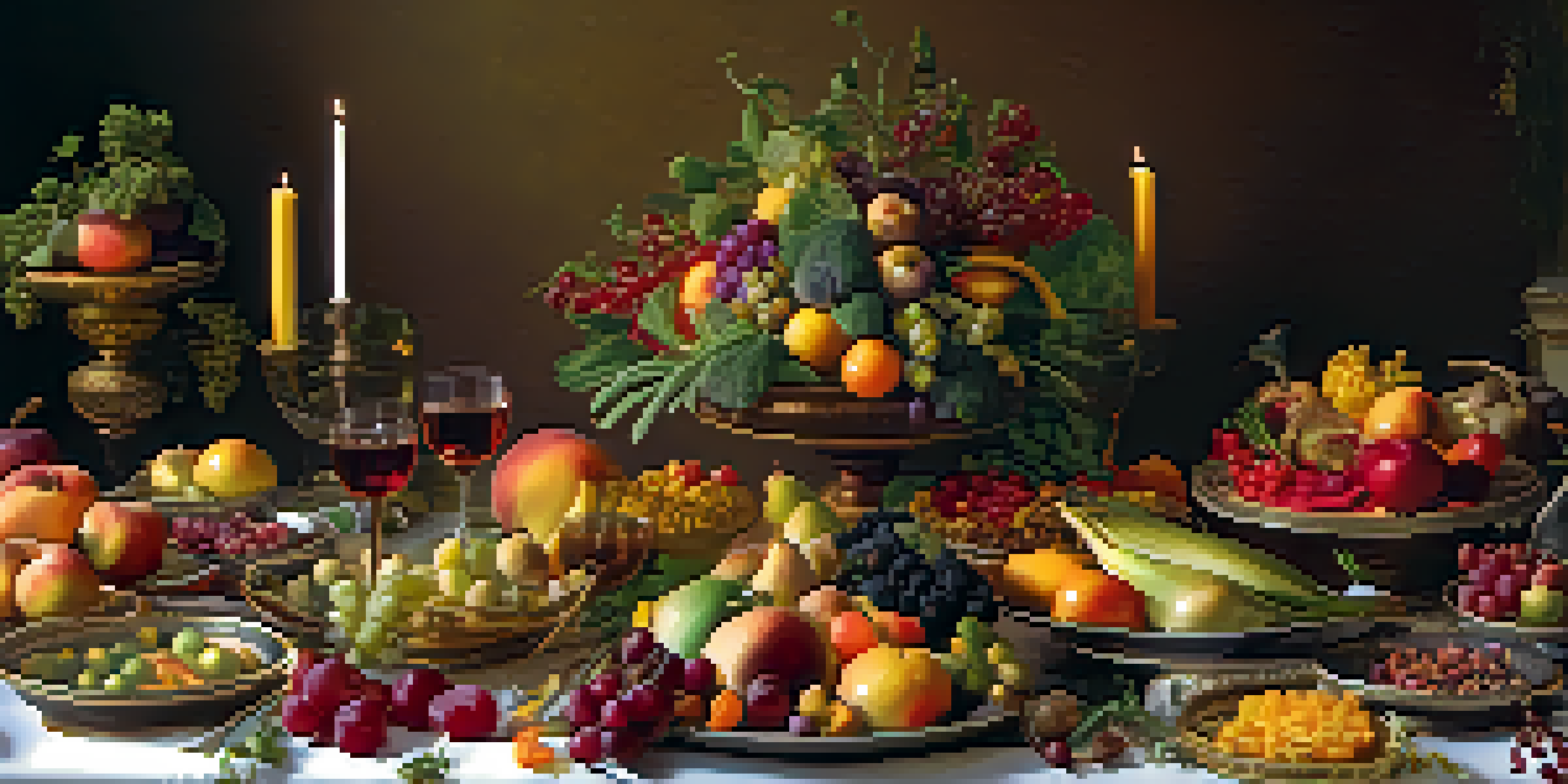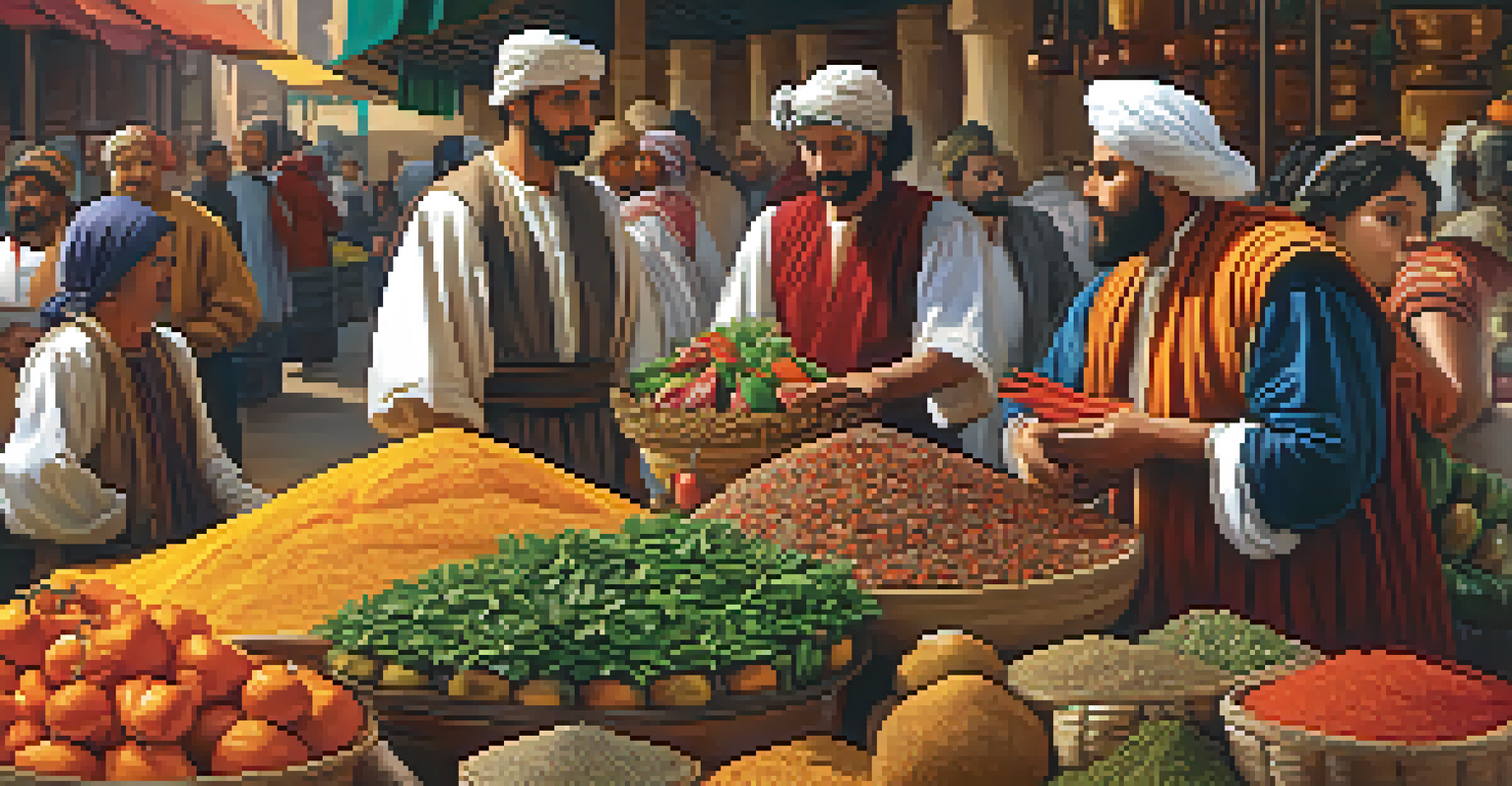Veganism in the Renaissance: A Shift in Eating Habits

The Renaissance: A Time of Change in Eating Habits
The Renaissance, spanning from the 14th to the 17th century, marked a significant shift in culture, art, and philosophy. Amid these changes, eating habits began to evolve as well. People started to question traditional practices and explore new ideas, which laid the groundwork for diverse dietary choices, including veganism.
Let food be thy medicine and medicine be thy food.
During this period, the rediscovery of ancient texts introduced Europeans to various philosophies about health and diet. Some thinkers advocated for a more plant-based diet, believing it promoted better health and spiritual well-being. This shift was also influenced by the availability of a wider variety of fruits, vegetables, and grains, thanks to exploration and trade.
As the Renaissance progressed, the notion of personal choice in dietary preferences became increasingly popular. The idea that what we eat can influence not only our bodies but also our minds and spirits resonated deeply with many, leading to the rise of vegetarianism and, eventually, early forms of veganism.
Philosophical Influences on Veganism
Philosophy played a crucial role in shaping dietary preferences during the Renaissance. Thinkers like Pythagoras, who lived centuries earlier, inspired many with his teachings about non-violence and compassion toward animals. These ideas began to permeate the Renaissance, encouraging a growing number of individuals to adopt plant-based diets for ethical reasons.

Additionally, the humanist movement emphasized the study of human welfare and morality, leading to reflections on the treatment of animals. This philosophical backdrop fostered discussions about the ethics of consuming animal products, causing some to reconsider their dietary choices. It wasn't just about health; it was about aligning one’s diet with personal values.
Renaissance Shift in Eating Habits
The Renaissance marked a significant evolution in dietary choices as people began to explore plant-based diets influenced by health, ethics, and a variety of new ingredients.
As a result, the Renaissance became a breeding ground for new ethical frameworks around food. These discussions laid the foundation for advocating veganism, as people began to view their eating habits as a reflection of their ethical beliefs.
The Role of Religion in Shaping Veganism
Religious beliefs significantly influenced dietary practices during the Renaissance. Many Christians observed fasting periods that restricted the consumption of meat, which often led to more plant-based meals. These practices contributed to a growing awareness of meatless diets and their potential benefits.
The greatest wealth is to live content with little, for there is never want where the mind is satisfied.
Moreover, some religious groups began to adopt vegetarianism as a form of spiritual discipline. By abstaining from animal products, they aimed to purify their bodies and souls, seeking a closer connection to the divine. This spiritual motivation resonated with many, leading to a broader acceptance of plant-based eating.
Consequently, these religious practices not only supported the notion of veganism but also fostered a sense of community among those who adhered to similar dietary restrictions. The intertwining of faith and food preferences helped pave the way for more widespread acceptance of veganism.
The Impact of Trade on Vegan Ingredients
The age of exploration brought a wealth of new ingredients to Europe, significantly impacting culinary practices. Spices, fruits, and vegetables from far-off lands became accessible, allowing for more diverse and flavorful plant-based dishes. This influx of ingredients played a vital role in promoting the idea of a plant-based diet.
As trade routes expanded, so did the knowledge of different culinary techniques and preservation methods. Cooks began experimenting with a variety of plant-based ingredients, enhancing the appeal of vegan meals. The allure of exotic flavors made vegan dishes more enticing, encouraging those who may not have considered such diets to explore them.
Philosophy and Ethics Drive Veganism
Philosophical ideas during the Renaissance encouraged individuals to adopt plant-based diets, aligning their eating habits with ethical beliefs about non-violence and compassion.
This abundance of new ingredients not only influenced personal dietary choices but also shifted societal perceptions of what constituted a satisfying meal. As vegan options became more versatile and appealing, they began to find a place at the table in households across Europe.
Vegetarianism as a Gateway to Veganism
During the Renaissance, vegetarianism emerged as a popular alternative to meat-heavy diets, often seen as a more humane choice. Many individuals began by reducing their meat consumption, exploring the variety of plant-based foods available to them. This gradual shift laid the groundwork for the acceptance of veganism.
As people experienced the health benefits of vegetarianism, they became curious about eliminating all animal products from their diets. This curiosity often led to discussions about the ethical implications of consuming dairy and eggs, prompting some to take the plunge into full veganism. The transition from vegetarianism to veganism was often driven by a combination of health, ethical, and philosophical motivations.
The rise of vegetarianism during this period illustrated that dietary changes could reflect evolving social values. The willingness to experiment with plant-based diets created a pathway for veganism, allowing individuals to align their eating habits with their evolving beliefs.
Culinary Innovations: The Rise of Plant-Based Recipes
The Renaissance was a time of great culinary innovation, with chefs beginning to experiment with plant-based ingredients in remarkable ways. Cookbooks from this era started to include meatless recipes, showcasing the versatility of vegetables, grains, and legumes. This culinary creativity contributed to the appeal of veganism.
Chefs sought to elevate plant-based dishes, making them not only nutritious but also visually appealing and flavorful. The use of spices and herbs transformed simple ingredients into gourmet meals, enticing even the most ardent meat lovers to reconsider their choices. This shift in culinary practice demonstrated that vegan meals could be just as satisfying as traditional meat-based dishes.
Culinary Innovations for Plant-Based Diets
The era saw culinary creativity flourish as chefs experimented with plant-based recipes, proving that vegan meals could be flavorful and satisfying.
As these recipes gained popularity, they encouraged more people to explore plant-based diets. The newfound appreciation for vegan cuisine helped solidify its place in Renaissance society, making it an integral part of the culinary landscape.
Legacy of Veganism in the Renaissance Era
The Renaissance laid the groundwork for many modern dietary movements, including veganism. The philosophical, ethical, and culinary changes during this period challenged conventional eating habits and encouraged individuals to think critically about their food choices. These shifts played a fundamental role in shaping contemporary views on diet and health.
While veganism as we know it today was not fully formed during the Renaissance, the seeds of its philosophy were planted. The discussions around ethics, health, and the environment that began during this era continue to resonate with us today, reflecting a timeless concern for the well-being of both humans and animals.

Ultimately, the Renaissance's impact on dietary practices demonstrates that food is not just about sustenance; it's about culture, identity, and values. This rich legacy reminds us that our choices around food can be a powerful form of expression, influencing our lives and the world around us.